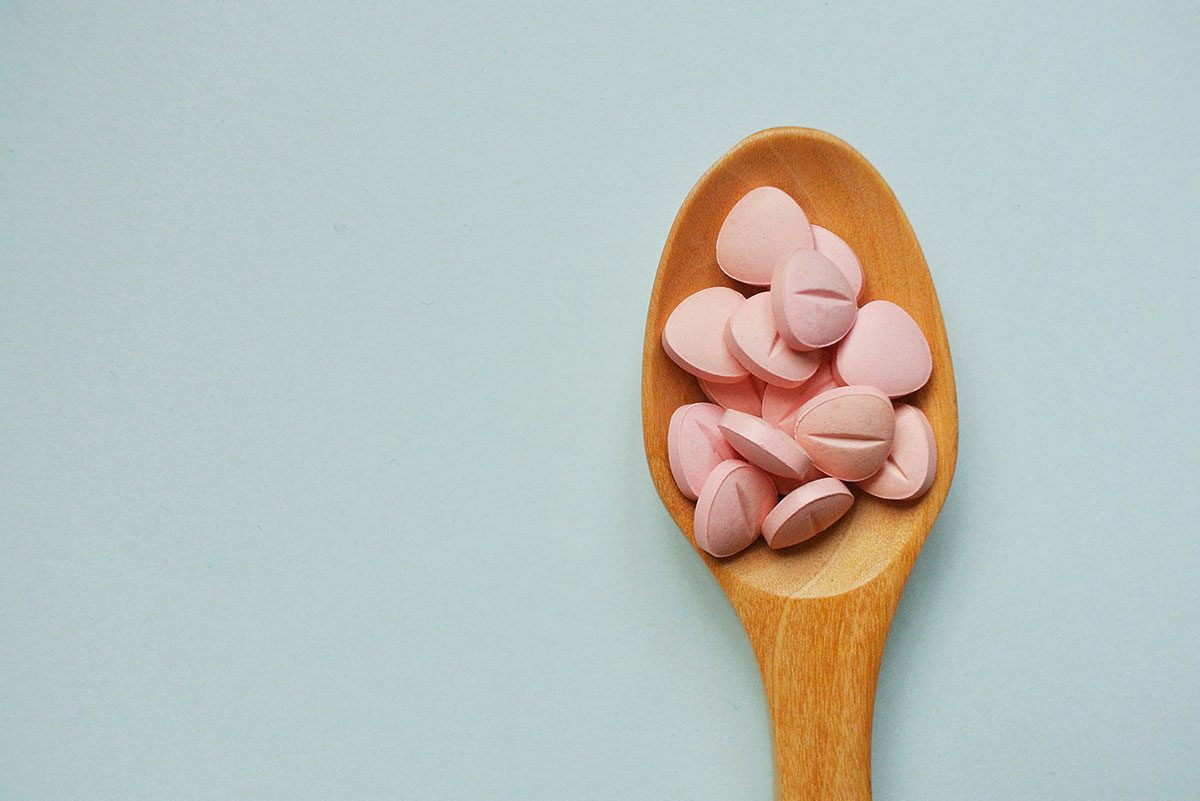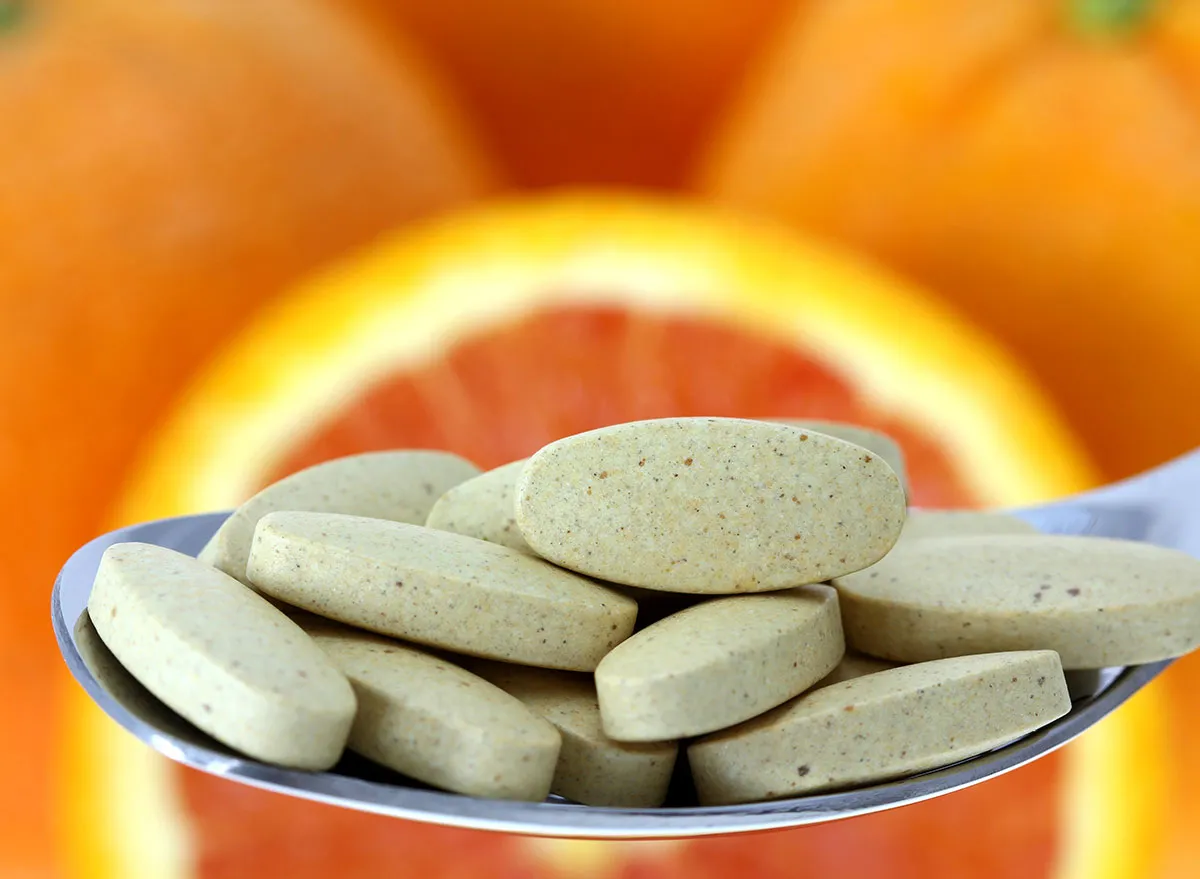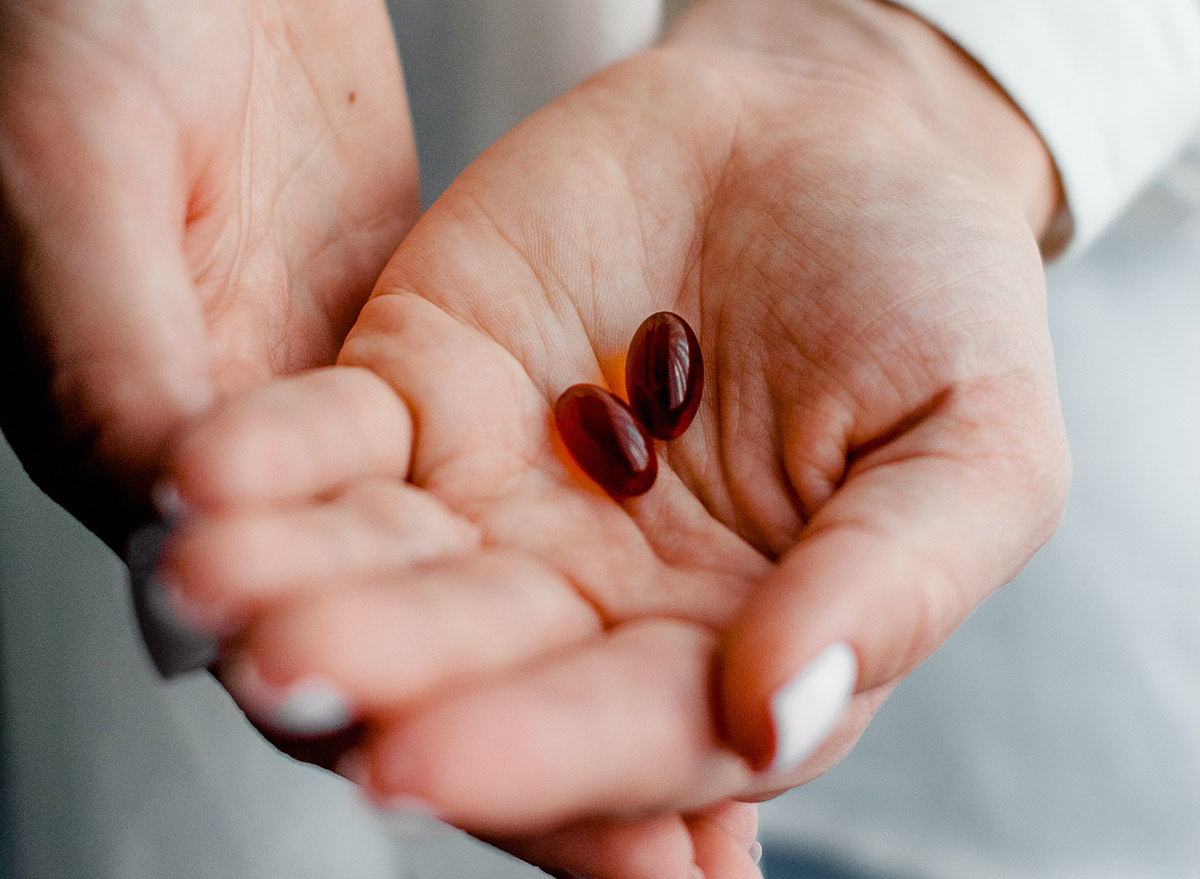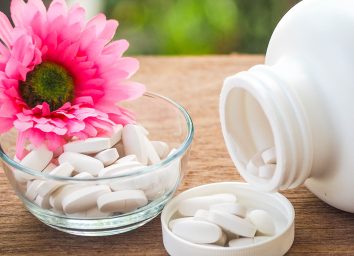Supplements You're Taking Too Much of, Say Dietitians

As it turns out, it is possible to have too much of a good thing. At least that's the case with supplements. Vitamins and minerals can get problematic—or even toxic—for our bodies when taken in large doses. For example, taking excessive amounts of niacin can lead to liver damage over time, while taking extreme doses of vitamin B6 can potentially lead to irreversible nerve damage.
Experts say there are specific supplements that people tend to overdo it on, either because they already get an adequate amount of it from food in their everyday diet, or because they're combining supplements that have some overlap in their nutrients. This can get especially risky with fat-soluble vitamins, which are stored in the body, where they can accumulate. Water-soluble vitamins are flushed out of the body with your urine, so they're less likely to cause health problems in high doses.
Needless to say, if you take daily supplements, it might be time to take stock of your dosages. Here are some of the most popular supplements to go overboard on, according to registered dietitians. After, be sure to read The One Vitamin Doctors Are Urging Everyone to Take Right Now.
Vitamin C

The recommended dietary allowance (RDA) for vitamin C is 90 milligrams a day for adult men and 75 milligrams a day for adult women. Angela Houlie, MS, RDN, says most people meet this requirement via the fruits and veggies in their diet and do not need to take a supplement.
"Most vitamin C supplements go way over the RDA," says Annamaria Louloudis, MS, RDN. "Plus, it's super easy to get 100% of the RDA for vitamin C from fruits and vegetables. Just one cup of chopped green bell pepper contains 120 milligrams of vitamin C."
While vitamin C is a water-soluble vitamin and toxicity is rare, high doses can still cause some unpleasant GI side effects—like nausea, vomiting, diarrhea, and cramps. At doses of 6 grams per day, vitamin C can even cause migraines.
By the way—the jury's still out on whether or not vitamin C supplements are as beneficial for the body as getting this vitamin through food.
"Some research shows that taking vitamin C supplementation throughout the cold season may modestly reduce symptoms of colds and help us get over colds faster, however, supplementation does not necessarily help to prevent colds," says Rachel Fine, RD, and owner of To The Pointe Nutrition in NYC.
Fine notes that people with a history of kidney stones may have a defect in the way their body metabolizes vitamin C, and thus should be careful about taking supplementation.
Probiotics

The hype has been building around probiotics in recent years—and with good reason: these live bacteria and yeasts keep our digestive system in tip-top shape. However, there's still no recommended dosage for probiotics, as research is still needed to determine how effective supplementation is—and at what amounts.
"Studies show that certain strains of probiotics may be applicable to certain health concerns and conditions, like constipation, antibiotic-associated diarrhea, and IBS," says Louloudis. "For a healthy gut, probiotic use may not be beneficial and may possibly be connected with some side effects, like brain fog. You can get probiotics naturally from fermented foods like pickles, sauerkraut, miso, tempeh, and kimchi, sourdough bread, and from dairy products like kefir and yogurt."
While typical dosages vary from product to product, the average dose is 1 to 10 billion colony forming units (CFU). Taking more than 10 to 20 billion CFU may not have dangerous side effects per se, but it could cause some GI discomfort, including gas and bloating.
Keep in mind that the risk of harmful effects from probiotics is higher if you're immunocompromised, according to the National Center for Complementary and Integrative Health. It's always a good idea to consult your doctor before starting a probiotics supplement.
Protein

As more studies linked protein intake to muscle growth and weight loss, and low-carb diets like keto and paleo became increasingly trendy, Americans started dramatically increasing their intake of this macronutrient. And eating too much protein can overwhelm your body, putting a strain on certain organs.
Protein needs can vary significantly based on your age, sex, activity level, and fitness goals, among other factors. That said, the RDA is a modest 0.8 grams of protein per kilogram of body weight—which translates to just around 65 grams for a 180-pound person.
That said, most experts agree that it's safe to take up to twice the RDA (1.6 grams per pound of bodyweight)—especially if you're someone who has a demanding fitness routine.
"Most consumers, even those following plant-based lifestyles, consume adequate amounts of protein," says Fine. "It is possible to consume excessive amounts, which can lead to dehydration, and increased metabolic burden on the bones, kidneys, and liver."
Research has indicated that excess protein not used by the body can put quite a burden on the bones, kidneys, and liver. In fact, people on very high protein diets have a higher risk of kidney stones. For the average person (who's not a bodybuilder or elite athlete) Harvard Health recommends aiming for no more than 2 grams of protein per kilogram of body weight.
Vitamin A

The RDA for Vitamin A—which helps your immune system and organs function properly and supports healthy vision—is 900 micrograms of retinol activity equivalents (RAE) per day for men and 700 micrograms RAE for women.
Since vitamin A is a fat-soluble vitamin, it can accumulate in the body if you consistently take too much of it. It's pretty difficult to overdo it with the foods in your diet, so vitamin A toxicity—also known as hypervitaminosis A—is mostly associated with taking supplements.
Symptoms can include nausea, dizziness, bone, and joint pain, headaches, and skin irritation—and in more extreme cases, coma or death. Chronic toxicity tends to occur with long-term ingestion of doses higher than 10 times the RDA.
"Like vitamin C, beta-carotene or vitamin A is abundant in food sources and most people can meet their needs from their diet alone," says Houlie. "Foods like squash, sweet potatoes, carrots, dark leafy greens, eggs, dairy, and meat are all great sources of vitamin A."
Houlie advises that most adults consume a maximum of around 3,000 micrograms of vitamin A per day.
For more healthy tips, read these next:








